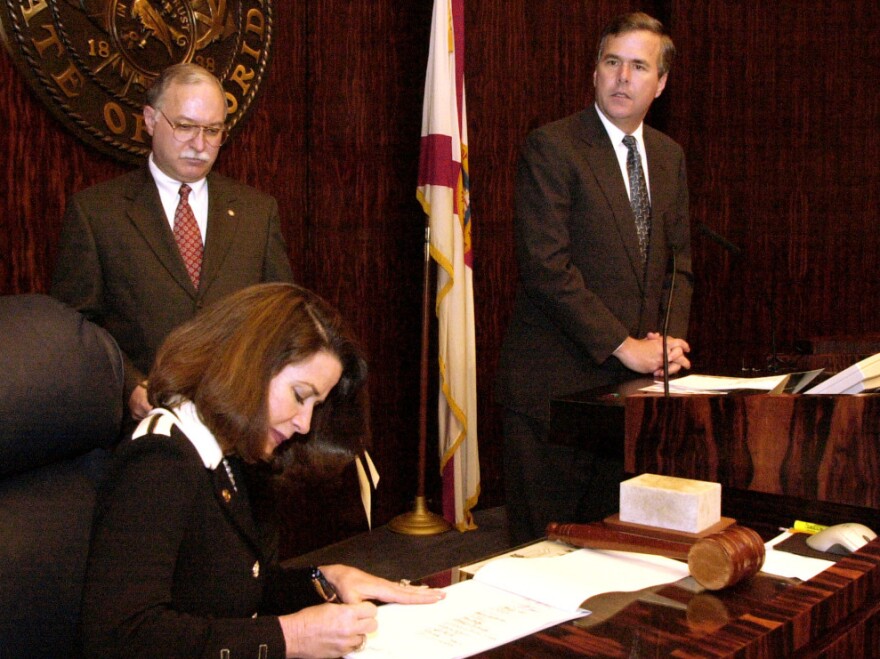In his first year as Colorado's secretary of state, Republican Scott Gessler has been sued eight times.
He has outraged Democrats by rewriting the state's campaign finance rules, tangled with counties over which voters they can send mail-in ballots to, and attracted national attention for participating in a fundraiser to pay off a campaign finance fine levied by his office.
"We've definitely shaken up the status quo, and I think that's happened a bit in some other states, too," he says.
Gessler came to the office from a career as one of Colorado's top Republican campaign lawyers, and he doesn't shy away from that partisan affiliation or from pursuing conservative policies, like pushing for a voter identification law.
"I'm very open about what my office does," he says. "I was very open about it on the campaign trail. And I welcome the debate, because I think as Coloradans, as Americans, we ought to discuss these issues, we ought to talk about them, we ought to think about them."
Grabbing Headlines Since 2000

Across the country, secretaries of state handle a mishmash of duties. Most of them administer elections and business filings and, in some places, run the division of motor vehicles.
So, a secretary of state's daily duties are not exactly the stuff of national news.
But in 2000, that changed for Florida Secretary of State Katherine Harris as she oversaw certification of that state's pivotal presidential vote. Harris, a Republican, declared George W. Bush winner of the state's electoral votes over Democrat Al Gore. The outcome, eventually upheld by the U.S. Supreme Court, determined the presidential race.
Over the past decade, partisan groups have started funneling a lot of money into secretary of state races, and the people they help get elected come to the role with a new mindset, says Doug Chapin of the Program for Excellence in Election Administration at the University of Minnesota.
"The decade following the 2000 presidential election made secretaries of state the rock stars of the election world," says Chapin. "Their job is not merely to make sure that the process works smoothly, but that it works in a way which is consistent with their view of how elections policy ought to be."
Gaining Political Relevance
Chapin says the parties see two advantages in controlling the secretary of state's office.
On the one hand, the secretary can advocate for the party's long-term election policies. And in an era of close votes, each party wants its person managing the proceedings.
Minnesota is a perfect example of both of those factors. Chapin says Republican lawmakers there have long complained about Secretary of State Mark Ritchie, a Democrat. "His belief in same-day registration is something that makes them uncomfortable," Chapin says.
Ritchie also has presided over two high-profile contested elections: the 2008 U.S. Senate race, won by Democrat Al Franken after a lengthy recount and state Supreme Court ruling; and the 2010 governor's race, won by Democrat Mark Dayton after a recount.
But Trey Grayson, Kentucky's former secretary of state, thinks people are overestimating the office's importance. "It's probably more bark than bite," he says.
Grayson now heads Harvard's Institute of Politics. He says there's a silver lining to this higher profile: Voters are starting to care.
"I believe our elections today are better administered than they were 15 years ago because of the attention and the demand for improved voting processes and voting equipment. The partisanship is a byproduct of that. It's also a sign of our times," he says.
More Election Battles To Come?
Elections experts say secretaries of state are still feeling out the boundaries of their office.
In Colorado, Scott Gessler's willingness to jump from one controversial issue to another has earned him the nickname "Honey Badger," after a satirical and viral nature video that describes the animal's preying habits.
Gessler has heard the nickname — and likes it.
"If you look at honey badgers, they're very independent animals. They're very fierce. People don't mess with them, and they usually win their fights," he says.
And Gessler likely has plenty of fights ahead of him.
In an era of razor-thin results, with both parties struggling for any possible election edge, the secretary of state's office isn't leaving the spotlight anytime soon.
Copyright 2012 CPR News


